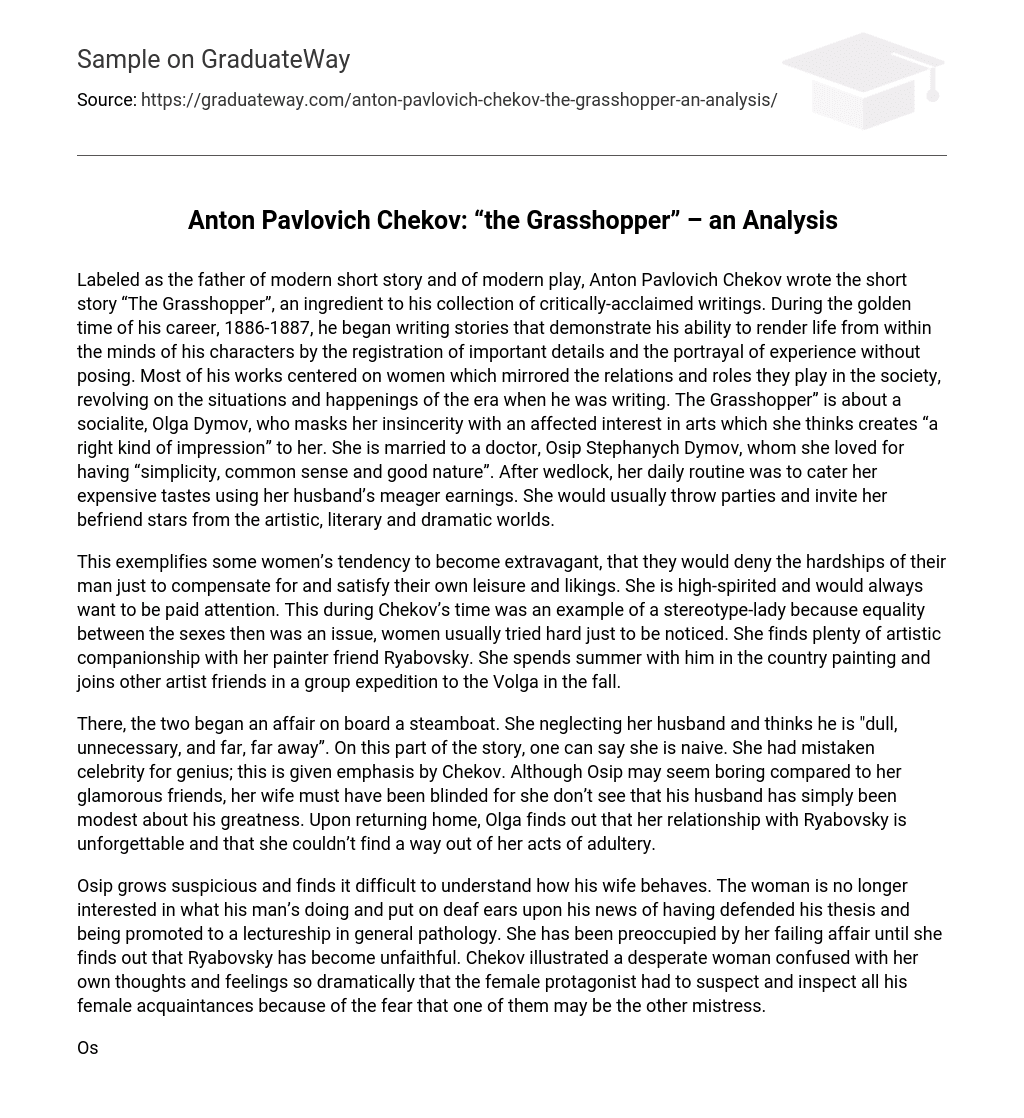Labeled as the father of modern short story and of modern play, Anton Pavlovich Chekov wrote the short story “The Grasshopper”, an ingredient to his collection of critically-acclaimed writings. During the golden time of his career, 1886-1887, he began writing stories that demonstrate his ability to render life from within the minds of his characters by the registration of important details and the portrayal of experience without posing. Most of his works centered on women which mirrored the relations and roles they play in the society, revolving on the situations and happenings of the era when he was writing. The Grasshopper” is about a socialite, Olga Dymov, who masks her insincerity with an affected interest in arts which she thinks creates “a right kind of impression” to her. She is married to a doctor, Osip Stephanych Dymov, whom she loved for having “simplicity, common sense and good nature”. After wedlock, her daily routine was to cater her expensive tastes using her husband’s meager earnings. She would usually throw parties and invite her befriend stars from the artistic, literary and dramatic worlds.
This exemplifies some women’s tendency to become extravagant, that they would deny the hardships of their man just to compensate for and satisfy their own leisure and likings. She is high-spirited and would always want to be paid attention. This during Chekov’s time was an example of a stereotype-lady because equality between the sexes then was an issue, women usually tried hard just to be noticed. She finds plenty of artistic companionship with her painter friend Ryabovsky. She spends summer with him in the country painting and joins other artist friends in a group expedition to the Volga in the fall.
There, the two began an affair on board a steamboat. She neglecting her husband and thinks he is “dull, unnecessary, and far, far away”. On this part of the story, one can say she is naive. She had mistaken celebrity for genius; this is given emphasis by Chekov. Although Osip may seem boring compared to her glamorous friends, her wife must have been blinded for she don’t see that his husband has simply been modest about his greatness. Upon returning home, Olga finds out that her relationship with Ryabovsky is unforgettable and that she couldn’t find a way out of her acts of adultery.
Osip grows suspicious and finds it difficult to understand how his wife behaves. The woman is no longer interested in what his man’s doing and put on deaf ears upon his news of having defended his thesis and being promoted to a lectureship in general pathology. She has been preoccupied by her failing affair until she finds out that Ryabovsky has become unfaithful. Chekov illustrated a desperate woman confused with her own thoughts and feelings so dramatically that the female protagonist had to suspect and inspect all his female acquaintances because of the fear that one of them may be the other mistress.
Osip becomes sick and eventually dies. Olga has lost the chance to value her husband. If there would be any moral the story would convey, it would be that those who possess genius do not flaunt their own superiority. Genuine greatness doesn’t have to be accompanied by fame or be paraded to be admired. Greatness comes from within of those who follow principles that do not cast shadows onto others. It is something one can get out from other people. Chekov’s style of writing the story is very descriptive.
He includes even the trivial events and details in people’s lives to aid us in imagining a real person when reading his writings—for him these are worthy of examination. He also used an episodic formatting which gives us a sense of having an insight to the characters’ inner feelings. More of the natures of the characters are revealed as the story progresses because of the detailed narration Chekov used. The author presents their weaknesses with their strengths to construct real, flawed human beings. The story is to remind us that no one is without flaw.
No one is bound not to commit mistakes and that regret is always at the latter part of every story. What seemed to have a nice beginning is not always destined to have a happy ending when one does not think twice of what he or she is doing. The worst part is that the most painful revenge would come from fate itself. We have to learn to take care of the things that we have because before we knew it, they’re already gone. “The Grasshopper” indeed is a masterpiece, enveloped within it is a golden rule we must apply all to ourselves.





